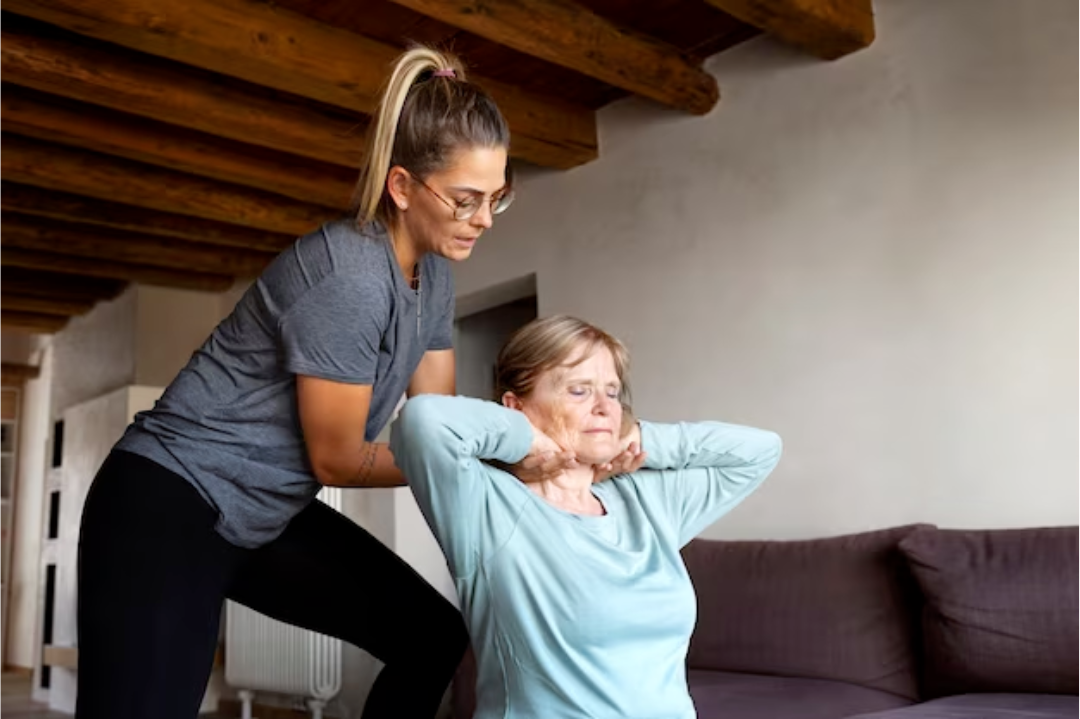As we age, maintaining strength and balance becomes increasingly essential for overall well-being and independence. Fortunately, physiotherapy offers seniors a powerful tool for achieving and maintaining these vital physical attributes. In this article, we delve into the transformative benefits of physiotherapy for seniors and how it empowers them to lead a more fulfilling and active life.
Physiotherapy, also known as physical therapy, focuses on restoring and enhancing physical function through targeted exercises and therapeutic techniques. For seniors, physiotherapy can address a wide range of age-related issues, including joint pain, muscle stiffness, and reduced mobility. By tailoring treatment plans to each individual’s specific needs, physiotherapists can help seniors improve their strength, balance, and coordination. These improvements not only reduce the risk of falls and injuries but also enhance overall quality of life.
Furthermore, through regular physiotherapy sessions, seniors can regain confidence in their abilities and gain a sense of control over their bodies. This newfound strength and balance empower them to participate in daily activities, hobbies, and social engagements with ease and joy.
Discover how physiotherapy can unleash the power within seniors, enabling them to live life to the fullest.
The Importance of Physiotherapy for Seniors
Physiotherapy plays a crucial role in maintaining and improving seniors’ physical well-being. It offers a holistic approach to senior care by addressing the underlying causes of physical limitations and providing personalized treatment plans. By working with a physiotherapist, seniors can regain control over their bodies and achieve newfound strength and balance.
Physiotherapy is not just about treating existing conditions; it also focuses on preventive measures. Through regular physiotherapy sessions, seniors and elderly can proactively strengthen their muscles, improve flexibility, and enhance balance, reducing the risk of future injuries and falls. This preventive approach empowers seniors to lead an active and independent lifestyle.
Understanding the Role of Physiotherapy in Enhancing Strength and Balance
With age, muscle mass naturally decreases, leading to reduced strength and stability. Additionally, factors such as joint stiffness and decreased flexibility can further contribute to balance issues. Physiotherapy addresses these concerns through a combination of targeted exercises, stretching routines, and balance training.
By incorporating resistance training into a senior’s physiotherapy regimen, muscles can be strengthened and rebuilt, leading to improved overall strength and stability. Resistance exercises can include using resistance bands, light weights, or even bodyweight exercises. Our physiotherapist will design a program that gradually increases in intensity to ensure safe and effective progress.
Balance training is another critical aspect of physiotherapy for seniors. Through exercises that challenge balance, such as standing on one leg or walking on uneven surfaces, seniors can improve their proprioception and stability. These exercises help to reduce the risk of falls and injuries, ultimately empowering elderly to move with confidence and freedom.
Common Age-Related Issues That Can Be Addressed Through Physiotherapy
As we age, our bodies undergo various changes that can lead to specific health issues. Physiotherapy can effectively address many of these age-related concerns, helping seniors regain function and improve their quality of life.
Joint pain is a common issue among seniors, often caused by arthritis or other degenerative conditions. Physiotherapy can provide relief through exercises that improve joint mobility, strengthen surrounding muscles, and reduce inflammation. By addressing the root cause of joint pain, physiotherapy allows seniors to regain mobility and reduce discomfort.
Muscle stiffness is another age-related problem that can significantly impact seniors’ ability to perform daily activities. Physiotherapy techniques such as stretching, massage, and manual therapy can help alleviate muscle stiffness and improve flexibility. These interventions not only reduce pain and discomfort but also enhance mobility and overall physical function.
Reduced mobility is a prevalent concern among seniors, often leading to a sedentary lifestyle. Physiotherapy aims to counteract this by implementing exercises and interventions that improve range of motion, strength, and endurance. By gradually increasing mobility, seniors can regain their independence and engage in activities they may have previously been unable to do.
Benefits of Physiotherapy for Seniors
The benefits of physiotherapy for seniors are vast and far-reaching. Here are some of the key advantages that seniors can experience through regular physiotherapy sessions:
- Enhanced Strength and Balance: Physiotherapy exercises and interventions help seniors build strength, improve balance, and increase stability. This leads to reduced risk of falls and injuries, enabling seniors to navigate their surroundings with confidence and independence.
- Pain Relief: Physiotherapy techniques such as manual therapy, massage, and stretching can alleviate joint and muscle pain, providing seniors with much-needed relief and improving their overall quality of life.
- Improved Mobility and Flexibility: Physiotherapy exercises focus on increasing range of motion, flexibility, and mobility, helping seniors perform daily activities with ease and reducing limitations caused by age-related conditions.
- Independence and Functionality: Physiotherapy empowers seniors to regain control over their bodies, enabling them to perform tasks independently and participate in activities they enjoy.
- Psychological Well-being: By improving physical function and reducing pain, physiotherapy positively impacts seniors’ mental health, leading to increased confidence, self-esteem, and overall well-being.
Benefits of Physiotherapy for Seniors
Mobility is a crucial aspect of seniors’ well-being, as it directly affects their ability to perform daily activities and maintain independence. Physiotherapy plays a vital role in improving mobility through targeted exercises and interventions.
One of the primary goals of physiotherapy is to increase seniors’ range of motion. By implementing stretching routines and joint mobilization techniques, physiotherapists can help seniors regain flexibility and improve their overall mobility. This enhanced range of motion allows seniors to engage in activities that require full joint movement, such as reaching for objects or bending down.
Balance training is another key component of physiotherapy for seniors. Through exercises that challenge balance and coordination, seniors can improve their stability and reduce the risk of falls. Balance exercises can include standing on one leg, walking on unstable surfaces, or practicing specific movements that require controlled coordination.
In addition to exercises, physiotherapists may also recommend assistive devices such as canes or walkers to support seniors’ mobility. These devices can provide stability and confidence, allowing seniors to move with greater ease and reducing the risk of falls.
By improving mobility and reducing the risk of falls, physiotherapy enables seniors to maintain their independence and lead a more active and fulfilling life.
Benefits of Physiotherapy for Seniors
Physiotherapy is a highly personalized approach to healthcare, and the same applies to seniors. Each individual has unique needs and goals, which is why our physiotherapists tailor treatment plans to suit specific requirements.
During the initial assessment, our physiotherapist will evaluate the senior’s current physical condition, identify any existing issues or limitations, and discuss their goals and expectations. This comprehensive evaluation allows the physiotherapist to design an individualized treatment plan that addresses the senior’s specific needs.
The treatment plan may include a combination of exercises, manual therapy, stretching routines, and balance training. The physiotherapist will guide the senior through each exercise, ensuring proper technique and providing modifications as needed. Regular progress evaluations will be conducted to track improvements and make adjustments to the treatment plan accordingly.
The individualized approach of physiotherapy ensures that seniors receive the most effective and appropriate interventions to meet their unique needs and goals. This personalized care maximizes the potential benefits of physiotherapy and enhances the senior’s overall well-being.
Book Vesta Care physiotherapy sessions by simply calling us or dropping a WhatsApp Message.
Incorporating Assistive Devices and Technology in Physiotherapy for Seniors
Assistive devices and technology play a valuable role in physiotherapy for seniors, enhancing the effectiveness of treatment and promoting optimal outcomes. These tools can aid in improving strength, balance, and overall physical function.
Assistive devices such as canes, walkers, or orthotic supports can provide seniors with additional stability and support during exercises and activities. These devices can help seniors maintain proper posture, distribute weight evenly, and reduce the risk of falls or injuries. The physiotherapist will assess the need for assistive devices and recommend the most suitable options for each individual.
Technology also plays a significant role in modern physiotherapy practices. Advancements in the healthcare industry have led to the development of various devices and tools that can enhance physiotherapy outcomes. For example, wearable fitness trackers can monitor seniors’ activity levels, heart rate, and sleep patterns, providing valuable data for the physiotherapist to track progress and make adjustments to the treatment plan.
Virtual reality (VR) technology is another exciting development in physiotherapy. VR can be used to create immersive environments where seniors can engage in therapy exercises and activities. This technology not only adds an element of fun and engagement to the sessions but also facilitates motor learning and improves functional outcomes.
By incorporating assistive devices and technology into physiotherapy for seniors, the treatment becomes more effective, engaging, and tailored to individual needs.
Finding the Right Physiotherapist for Seniors
Finding the right physiotherapist for seniors is crucial to ensure a positive and successful treatment experience. Here are some key factors to consider when selecting a physiotherapist:
- Experience and Expertise: Look for a physiotherapist with experience working specifically with seniors. They should have a deep understanding of age-related conditions, limitations, and effective treatment approaches.
- Communication and Empathy: A good physiotherapist should be able to communicate effectively with seniors, listen to their concerns, and provide clear instructions. Empathy and compassion are crucial qualities that help establish trust and rapport.
- Accessibility and Convenience: Consider the location and accessibility of the physiotherapy clinic. Ideally, it should be easily accessible for seniors, with convenient appointment scheduling options.
- Collaborative Approach: A good physiotherapist should work collaboratively with the senior, involving them in goal-setting and treatment planning. This ensures that the treatment aligns with the senior’s preferences and goals.
- Reviews and Recommendations: Read reviews or seek recommendations from other seniors who have received physiotherapy. Their experiences can provide valuable insights into the quality of care provided by different physiotherapists.
Finding the best physiotherapist is essential for a positive treatment experience and optimal outcomes. It’s worth investing time and effort into research to ensure the best possible care.
Creating a Holistic Approach to Senior Care with Physiotherapy
Physiotherapy plays a vital role in creating a holistic approach to senior care. By addressing physical limitations, improving strength and balance, and promoting overall well-being, physiotherapy enhances the overall quality of life for seniors.
In addition to physiotherapy, incorporating other elements of senior care can further enhance the holistic approach. Nutrition, for example, plays a crucial role in maintaining optimal health and supporting physical function. Seniors can benefit from a balanced diet that includes essential nutrients for muscle strength, bone health, and overall vitality.
Regular exercise, beyond physiotherapy sessions, is also essential for seniors’ well-being. Encouraging seniors to engage in activities they enjoy, such as walking, swimming, or participating in group exercise classes, can provide additional benefits to their physical and mental health. Physiotherapists can guide seniors in finding suitable exercise options and help develop safe and effective exercise routines.
Social engagement is another crucial aspect of holistic senior care. Loneliness and isolation can have a detrimental impact on seniors’ well-being. Encouraging seniors to participate in social activities, join clubs or community groups, or engage in hobbies can promote emotional well-being and overall happiness.
By combining physiotherapy with other elements of senior care, a holistic approach can be created, supporting seniors’ physical, emotional, and social well-being.
Conclusion: Embracing the Power of Physiotherapy for Senior Empowerment
Physiotherapy offers seniors a powerful tool for achieving and maintaining strength, balance, and overall physical well-being. Through tailored treatment plans, targeted exercises, and therapeutic techniques, physiotherapists empower seniors to regain control over their bodies, reduce the risk of falls and injuries, and lead a more fulfilling and active life.
The transformative benefits of physiotherapy for seniors are vast, ranging from enhanced strength and balance to pain relief, improved mobility, and increased independence. By incorporating assistive devices and technology, physiotherapy becomes even more effective and engaging.
Embrace the power of physiotherapy and empower seniors to live life to the fullest. With its transformative benefits, physiotherapy unlocks new possibilities, enabling seniors to enjoy a more fulfilling and active lifestyle.




